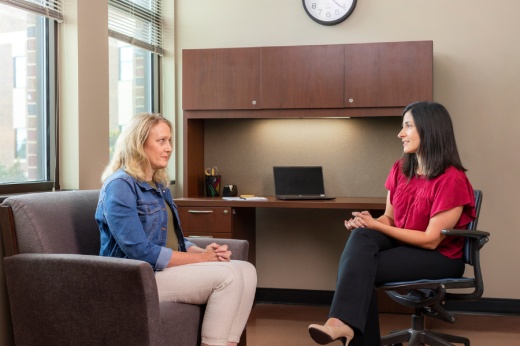It is no secret that the COVID-19 pandemic has impacted the mental health of individuals worldwide. Feelings of isolation, fear and grief have skyrocketed in recent years, leaving many to cope with heightened mental health conditions or mental illnesses for the first time.
In the first year of the COVID-19 pandemic, prevalence of anxiety and depression increased by 25% across the globe. Dorothea Pitikas, LCSW, who has been working as a licensed clinical social worker at Lone Star Circle of Care for 12 years, said elevated stress levels are partly to blame.
“The pandemic is definitely unprecedented, which has led to unprecedented levels of stress for our patients here,” Pitikas said. “Even if you didn’t have a mental health condition before, you were still extremely impacted by what was happening. People lost their jobs. They stopped coming in for appointments. Their routines were off, they were home all the time, they became really isolated.”
At the onset of the pandemic, children and adolescents dealt with their education being completely disrupted and complete isolation from their peers. Years later, many of them are still catching up academically or struggling socially.
“They’re catching up and I think it’s definitely affected their self-esteem and how they perceive themselves,” Pitikas said. “[For teenagers,] their peers are more important than everyone else, and so they were completely isolated from their friends and we’re seeing the impact that’s had on them.”
For parents, the pandemic forced an adjustment to a work-from-home lifestyle while simultaneously having to take care of their children’s needs and education while schools were shut down. Exhaustion, worry and burnout set in quickly.
“Women and mothers were already taking on the brunt of home care and balancing full-time jobs, and now all of a sudden are becoming teachers and having to take care of their kids when daycare got shut down,” Pitikas said. “[It’s] the stress of taking care of everyone else’s needs.”
Pitikas said the pandemic also led to declines in the mental health of Black, Indigenous and people of color communities. Already dealing with barriers to health care due to systemic oppression, the pandemic intensified all of those stressors.
Additionally, the pandemic had a unique impact on the mental health of older adults. Spikes in depression and anxiety were commonly seen in seniors, especially those who live alone or spent months in isolation at a nursing home.
“Maybe they were really engaged in their community, social activities, had weekly friend groups or lunches. That all stopped,” Pitikas said. “Older Americans in nursing homes could not have any visits from their families for months and months and months. We see depression and stress with them as well.”
While some sought help, many others are still suffering from poor mental health caused by the pandemic.
“We know that for people with mental health conditions, the stress of holidays can worsen or trigger those symptoms that they deal with,” Pitikas said.
Pitikas said mental health often declines during the holiday season due to everyday routines being disrupted. Children are home from school, and people are normally taking time off from work and staying up late at night. The pandemic has also led to increased drug and alcohol use, which can spike during the holidays and contribute to the rise of mental health conditions.
“This year might be the first time that families are getting together and seeing people they haven’t seen in a really long time. That can definitely bring on a lot of anxiety for a number of reasons,” Pitikas said. “You can be in a room full of people and still feel really lonely—especially if there’s family stuff that’s happened or you’re dealing with mental health issues and not getting the care you need.”
For those who have mental illnesses, Pitikas said one vital tool for combating symptoms during the holidays is checking in with yourself daily. Taking a few minutes to meditate, set boundaries and focus on mental wellness can be transformative for patients with depression and anxiety.
“Being aware is such a huge key part of getting through the holidays and setting boundaries. Recognizing, you know, ‘I don’t have to do all of these things. I can take a day for me. I can take an hour for me and just kind of be by myself [to] check-in with myself. That can be really helpful around the holidays,” Pitikas said. “... Ask yourself, ‘How am I doing today? What do I need today?’ I like the idea of taking things one day at a time and just checking in with yourself and others.”
For checking in on friends and family members, recognizing warning signs is key. Changes in their habits, routine, emotions and attitude can be indicators of mental health conditions coming into being. Pitikas said a simple phone call or text message can go a long way in making someone feel seen and cared for.
“Maybe a friend that you haven’t heard from in a while is showing behavior that's concerning or maybe unusual for them. Maybe you see changes in their attitude or their appetite or sleep. Just things that aren’t really usual for them can be warning signs,” Pitikas said.
One way to encourage loved ones to open up about their mental health struggles is by sharing personal experiences. People often feel more comfortable sharing their emotions when they realize they are not alone in their feelings.
“I think connecting with someone that way and sharing your own struggles opens up the door to that other person feeling comfortable and being more open to sharing what they’re dealing with,” Pitikas said.
Though there are ways to alleviate mental illness symptoms at home, the best way to find relief is through the help of a professional. Patients who reach out for behavioral health services at Lone Star Circle of Care are immediately scheduled for a behavioral health therapy intake with one of its therapists, who are either licensed clinical social workers, licensed professional counselors or clinical psychologists.
To get a detailed report on a patients’ current mental health state, Lone Star Circle of Care therapists ask questions about what the patients are currently dealing with, what they have dealt with in the past and their family history. From there, the therapist will provide options in regard to therapy, psychiatry and psychiatric medication.
“You are not alone. Many people deal with mental health conditions ... There are resources to help you; Lone Star Circle of Care is one of them,” Pitikas said. “You can call and make an appointment. Just calling us and asking for help is the best thing that you can do to get on the path of getting back on track.”
If you or a loved one are struggling with mental health, do not hesitate to contact a professional at Lone Star Circle of Care for help. Call 877-800-5722 today to schedule an appointment with one of its therapists, or visit its website lonestarcares.org to learn more.
The above story was produced by Community Impact's Storytelling team with information solely provided by the local business as part of their "sponsored content" purchase through our advertising team. Our integrity promise to our readers is to clearly identify all CI Storytelling posts so they are separate from the content decided upon, researched and written by our journalism department.
Select your community
Support Us
News
- Austin Metro
-
Houston Metro
- Houston Metro Home
- Bay Area
- Bellaire | Meyerland | West University
- Conroe | Montgomery
- Cy-Fair | Jersey Village
- Cypress
- Heights | River Oaks | Montrose
- Katy | Fulshear
- Lake Houston | Humble | Kingwood
- New Caney | Porter
- Pearland | Friendswood | Manvel
- Spring | Klein
- Sugar Land | Missouri City
- The Woodlands
- Tomball | Magnolia
- Dallas | Fort Worth Metro
- San Antonio Metro







